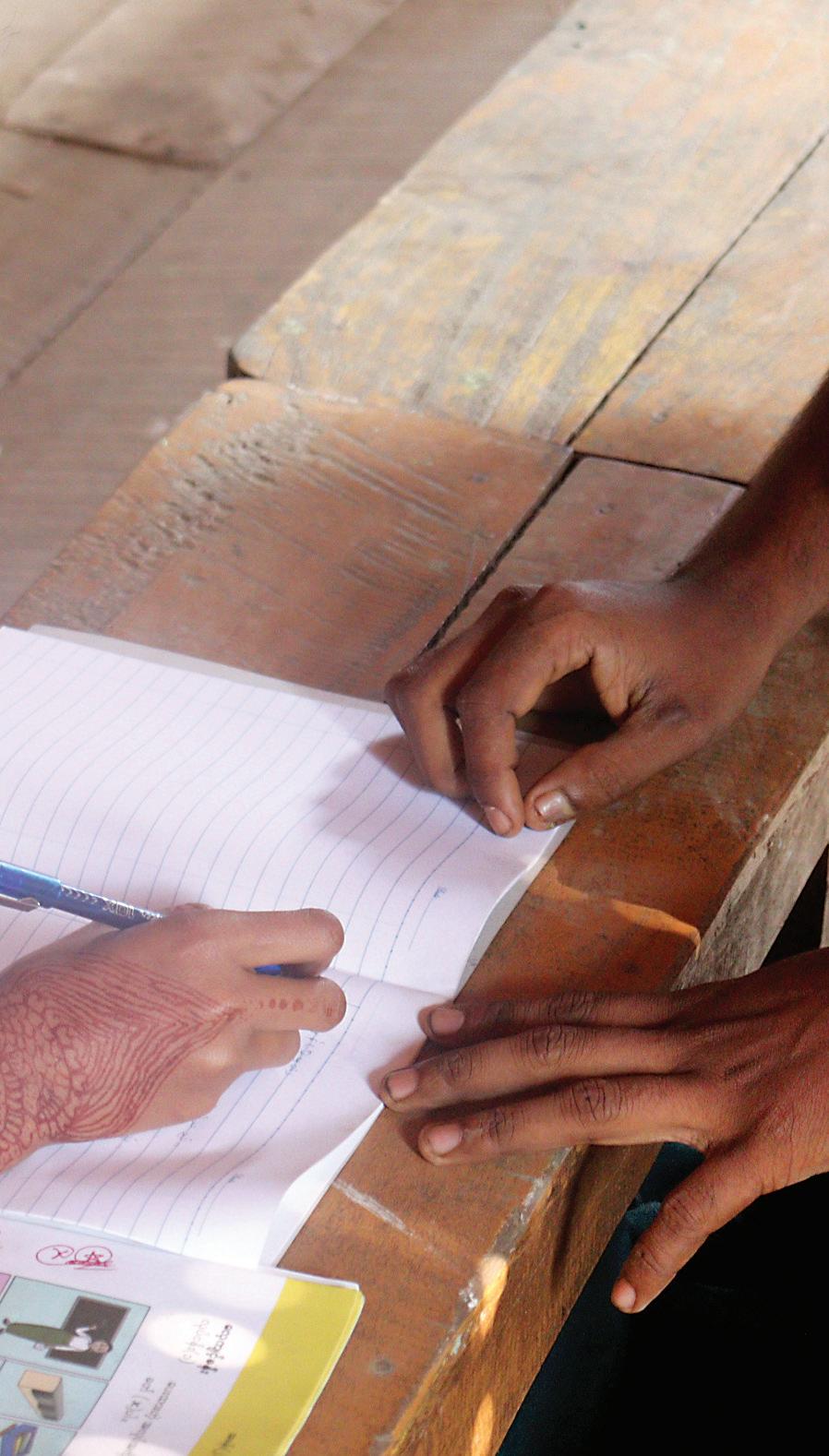
5 minute read
Myanmar (Empowerment)
What Rights Based Empowerment Program
Where Kayin, Chin and Rakhine Districts
Advertisement
Who 46,572 people in partnership with other agencies
ALWS Action ALWS: $196,500
DFAT: $139,500
Total: $336,000
Why our help is needed
While many people in Myanmar face multiple challenges, people who have added vulnerabilities - language barriers, lack of secure land tenure, lack of access to markets - need extra support.
Our action together in 2022
• 115 farmers using climate smart agricultural practices such as System of Rice Intensification
• 97 households established new income sources
• 39 infrastructure projects constructed with communities, including health clinics, roads, latrines, school renovations, bridges, meeting halls, irrigation systems
• 87% of families with improved water and sanitation facilities
• 23 communities developed disaster preparedness plans
• 42% of families reported a change that women have at least equal power in household decision making
• 199 meetings between rights holders and duty bearers to support rights based community development.
What we’re learning
Since the military coup, collaboration and coordination is limited with the de facto government. To adapt, LWF is finding new ways to collaborate with other international, national and local civil society organisations, in particular to link with services, and provide training to communities.
Our impact
With development of a new Gender Equity strategy, exciting changes have been reported by communities, where traditionally women have had limited rights, leadership and decision making power. Women in leadership positions has increased significantly from previous levels and women report greater participation and decision making in families and community activities.
Myanmar (Human rights)
What A Rights-Based Advocacy Approach for Advancing Land, Legal Identity and Women’s Rights in Myanmar
Local Partner LWF Myanmar
Where Rakhine, Chin and Kayin States
Who 1,847 direct beneficiaries: 508 women; 494 men; 433 girls; 412 boys In partnership with other agencies
ALWS Action This project runs from 2020-2022. Total funding provided across the project period from ALWS $133,295 (NB none sent in 2022)
Why our help is needed
Vulnerable communities in rural areas of Myanmar face challenges in accessing basic human rights, including their right to claim and access their land, their right to a legal identity, and the rights of women.
Our action together in 2022
• 281 farmers received land registration certificates
• 410 people (including 278 children) obtained legal documentation
• 49 women increased their knowledge and capacity to claim their rights
• 24 community based organisations have increased their advocacy capacity
• 1 local representative presented key advocacy priorities in international forums.
What we’re learning
In the past year a “Gender 360o strategy” has been rolled out in this project with a vision to work towards a world where women and men hold equal decision-making power in their homes and communities. While women still do not feel like they are being listened to in community decision making (only 15 of women’s group members say they do), progress is being made such as in increases in the proportion of women village development committee chairpersons.
Our impact
Innovative products such as comic books, animated videos and community guidebooks can effectively share information about land rights, legal identity rights and women’s rights. Communities are now increasingly interested in learning about their rights.
Eggs to inspire
It’s estimated 880,000 Rohingya people from Myanmar now live as refugees in camps in Cox’s Bazar, Bangladesh.
Ms. Johora Khatun is one of those people, living with her daughter, and her husband who has a disability that prevents him from doing any work.
Johora received three native chickens and training in poultry-raising through ALWS partner, RDRS Bangladesh. She says:
“Before training, I was not interested to rear the poultry, as maintaining hygiene in temporary chicken-cage or paper box was difficult in the congested living area in Rohingya camps.
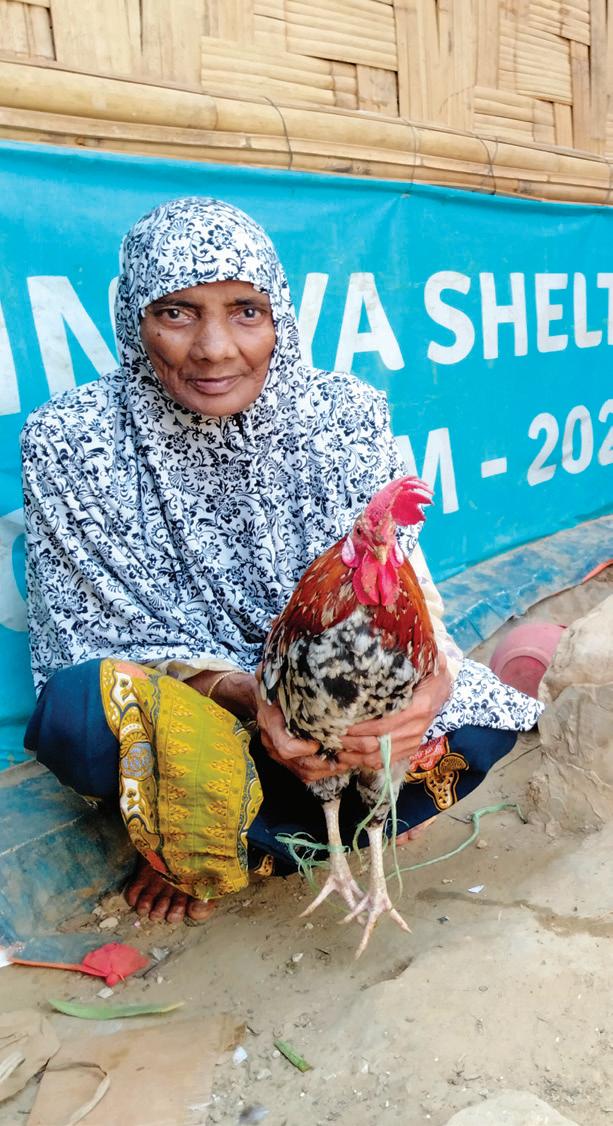
“Now I have learned about low-cost chicken’s food-processing technique, elements for chicks’ food preparation and measurement, as well as market linkage system. This was massive learning for me.”
Now, the family use some of the eggs produced for food, while others are incubated to expand the flock. When chickens are 105 days old, she sells them.
Johora’s dream is to continue growing her business to ensure food security for her family. She also hopes to inspire other women like her to start their own businesses.
Bangladesh: Refugees
What Building Resilience for FDMN and Nearby Host Community in Cox’s Bazar to improve their Living Standards & Build peaceful co-existence between the communities.
Local Partner RDRS - Bangladesh
Where Refugee camps Host communities of Sadar, Ukhiya, Ramu & Moheshkhali Cox’s Bazar Bangladesh.
Who 22,638 people in Rohingya refugee camps and surrounding Host communities.
ALWS Action ALWS: $24,348
Why our help is needed
The forced displacement of Rohingya refugees from Myanmar in Bangladesh has led to a global humanitarian catastrophe. There are over 1 million Rohingya refugees currently living in camps in Cox’s Bazar in Bangladesh
Our action together in 2022
• 34,612 metres of drainage channels cleaned, and 6,052 metres sprayed to control mosquitoes
• 5,000 tree seedlings planted to restore natural environment in the refugee camps
• 9000 Mosquito Nets distributed in three camps
• 2,935 vulnerable families received blankets
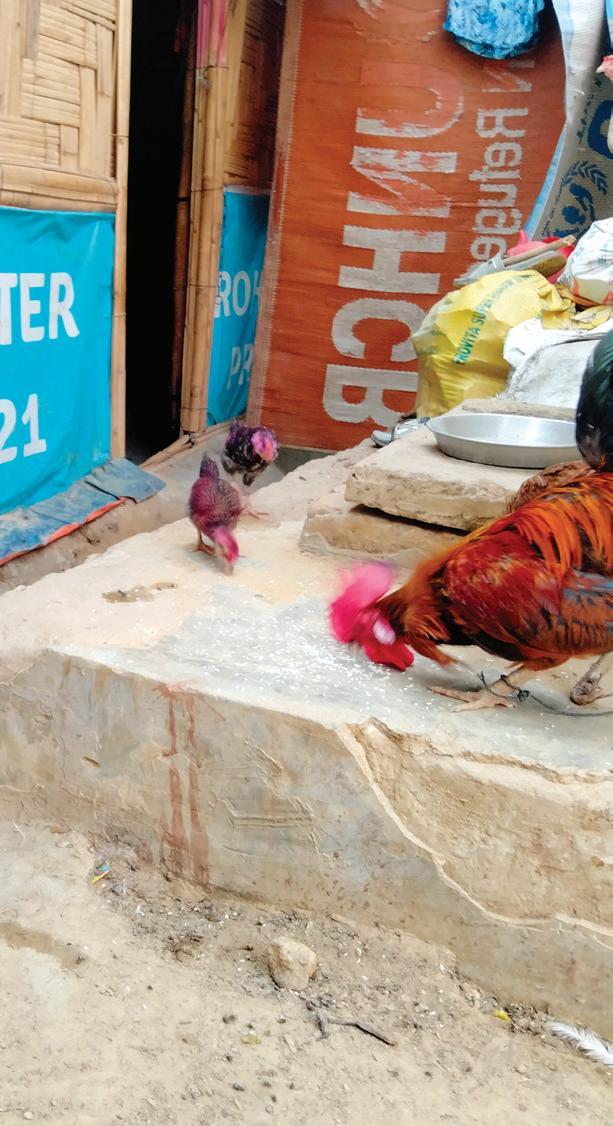
• 1,430 pregnant and lactating Rohingya women received supplementary food items for nutritional value-addition
• 750 people trained to increase income through gardening, poultry-raising and small business
• 108 people increased income through Cash-for-Work activities
• 3,600 received primary learning materials.
What we’re learning
Enabling female teachers and students to establish Hygiene Corners in schools can increase school attendance.
Our impact
22,638 people received life-saving services, and built skills in income-generating activities.
ALWS acknowledges the support of the Australian Government in Bangladesh through the Australian Humanitarian Program (AHP).
Nepal (Empowerment)
What Local Initiatives for Community Empowerment and Development Project (LICED)
Local Partner LWF Nepal, with local implementing partners
Where Kailali, Jhapa, Morang, Lalitpur, Bardiya, Surkhet, Dolakha districts in Nepal
Who 12,767
(in partnership with other agencies)
ALWS Action ALWS: $106,500
DFAT: $597,031
Total: $703,531
Why our help is needed
You work with communities at risk from poverty and being marginalised - Dalit, ethnic minority groups, Bhutanese refugees and people with disabilities.
Our action together in 2022
• 2,585 farmers have increased the field and quality of their produce (including rice, maize, vegetables, legumes and fruits) through modern farm methods
• 765 people have increased their income by starting up or expanding small businesses such as livestock rearing, grocery shops, vegetable farming and tailoring
• 703 people have increased access to drinking water through installation of 34 raised hand pumps.
• 417 households have improved cooking stoves, solar lights and bio-gas in their homes
• 6 communities have established Grain Banks for times of flooding, or lean harvests
• 2 communities have established emergency shelters
• 1,598 people benefit from COVID health supplies.
What we’re learning
An ALWS-supported Localisation Review found:
• LWF Nepal is an important intermediary with local partners, and this should be embraced and refined
• implementing partners value technical, organisational and funding support
• LWF’s status and international connections increase partners’ diversification of funding
Our impact
99 community institutions now proactively include people with disabilities!
Tears to Tricycle
Ms Ganga Chaudrey is blind. Her husband Lakhan cannot walk.
Before your help through ALWS, and our partner LWF Nepal, Ganga recalls:
“I used to cry a lot every day wondering how can I take my husband even for medical treatment or documentation as I am blind.”
Lakhan was supported with a tricycle-chair, which has greatly increased his mobility, so he can increase family income from his tailoring skills, using the new sewing machines he also received. In fact, this new independence has enabled Lakhan to take on 12 trainees that he mentors in tailoring:
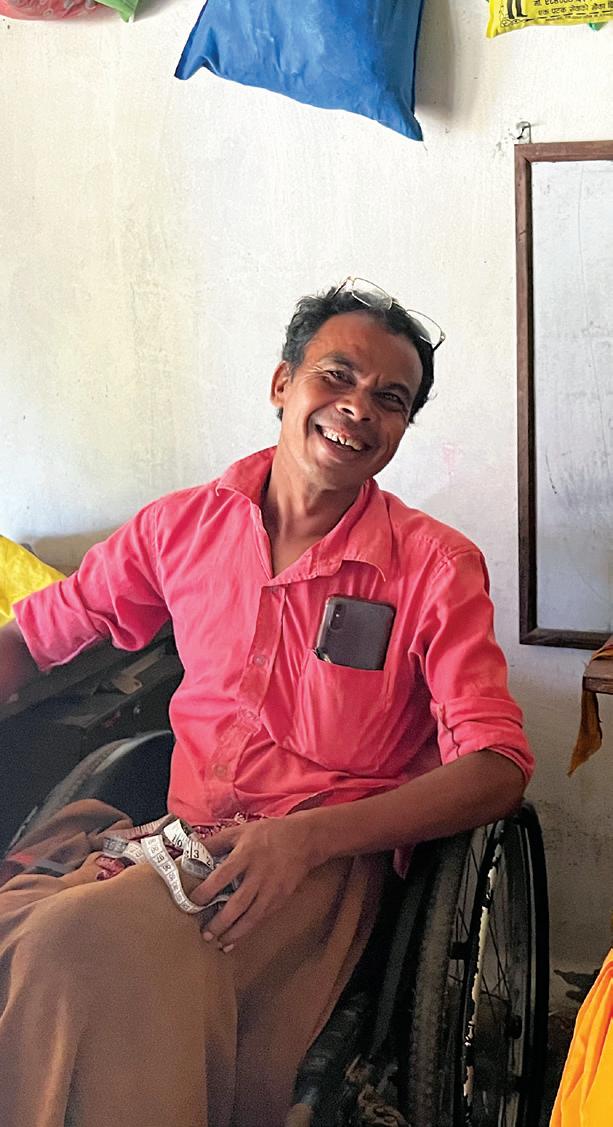
“I’m very happy that I’m being able to teach others and can create and income for them. And also happy that I can fulfill the needs of my family. I wasn’t confident to come in front and talk in front of people, but I can do that now.”
Meanwhile, Ganga was trained in human rights for people with disabilities, and now advocates for others:
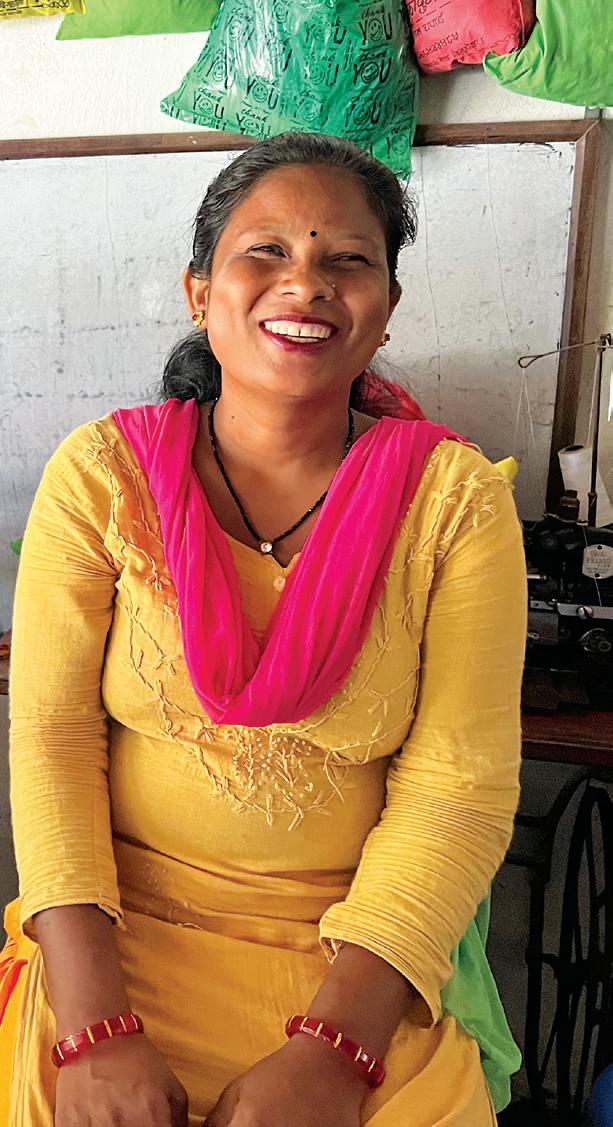
“I have learnt so much that I want to help others ... It shouldn’t be only me who has developed. I have seen growth in myself despite being a blind person. This training has given me a reason to live. I am very thankful for myself and my husband to the supporters of Lutheran.”





